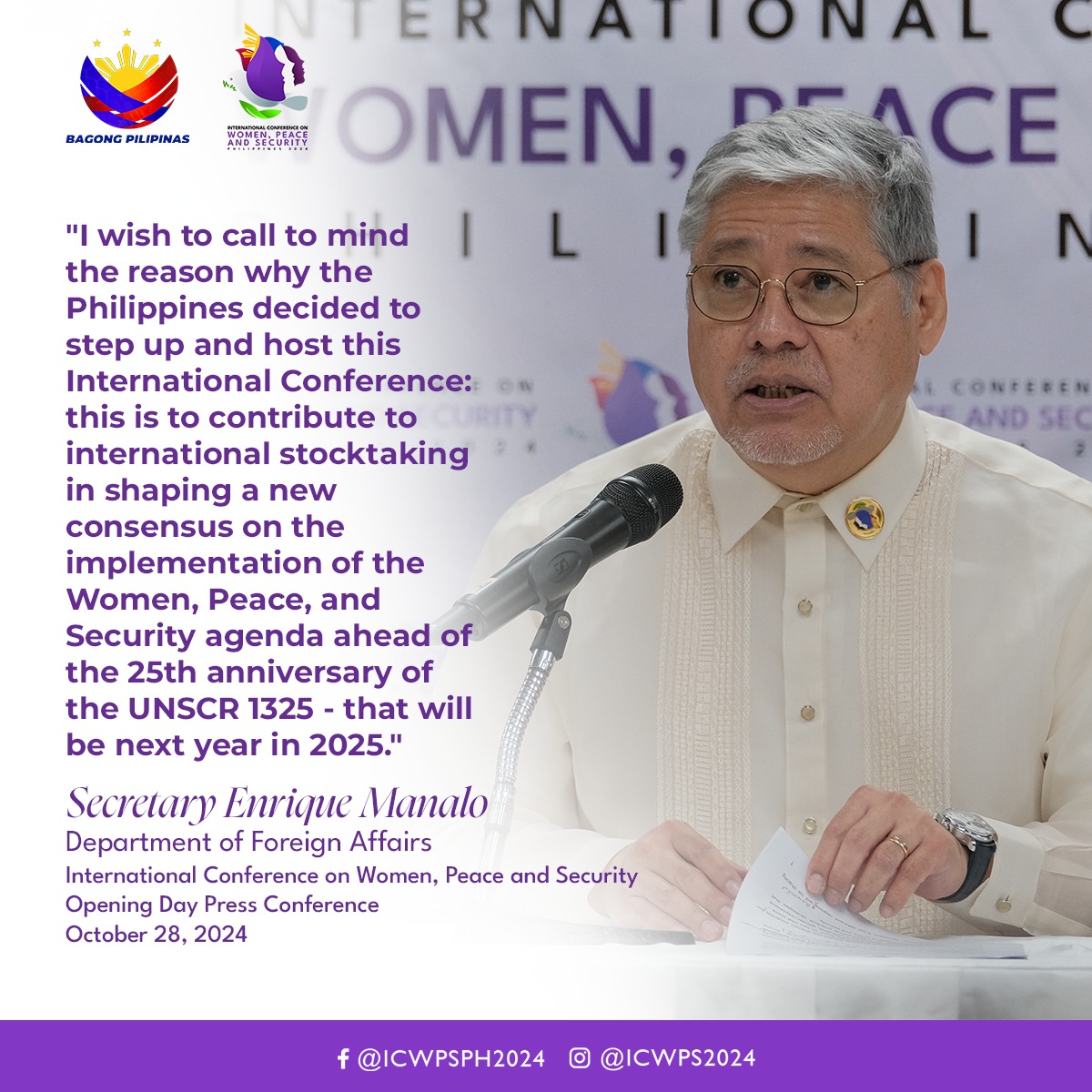

MANILA, Philippines – The Philippines is hosting the International Conference on Women, Peace, and Security (ICWPS), drawing over 700 delegates, including ministers and high-level officials from 80 countries, to forge new pathways for advancing women’s roles in peace and security, the Department of Foreign Affairs (DFA) said.
Commencing on Monday (Oct. 28), and will run until Wednesday (Oct. 30), the conference opened with the theme “Forging Collaboration and Convergence for Advancing Women, Peace, and Security,” as it underscores the need for collective action to integrate women’s voices into peace processes and peacebuilding globally.
According to the DFA, the conference brings together leaders from government, civil society, and academia to assess the progress made in the WPS agenda and to strategize on overcoming challenges to women’s participation in peacebuilding.
On its first day, the conference adopted the Pasay Declaration on Women, Peace and Security.
´This important outcome document, drafted by the Philippines and previously negotiated among UN Member States represented at the UN headquarters in New York, outlines renewed commitments to accelerate the WPS agenda and serves not just a pledge, but also as a blueprint for action, driving the global community toward a more inclusive, sustainable approach to peace,” the DFA mentioned.
The conference opened with a High-Level Segment on Monday morning, featuring remarks from First Lady Louise Araneta-Marcos, Secretary for Foreign Affairs Enrique A. Manalo, Presidential Adviser on Peace, Reconciliation and Unity Carlito Galvez Jr., Secretary for Budget and Management Amenah Pangandaman and Deputy Secretary-General of the United Nations, Amina J. Mohammed.

(Courtesy of International Conference on Women, Peace and Security - ICWPS)
“The session underscored the Philippines’ dedication to championing women’s rights and leadership within peace and security agendas and celebrated the resilience and contributions of women across sectors, setting a tone of inclusivity and collaboration that reflects the Conference’s overarching goals,” the DFA emphasized.
The first day continued with two high-level panels that tackled strengthening gender-responsive peace and security frameworks.
Ministers and high-ranking officials from Algeria, Namibia, Indonesia, Poland, Latvia, Mali, UAE, the Philippines, the UK, and Libya emphasized actionable strategies for governments to implement WPS frameworks effectively and national policies and allocating resources to support women’s leadership in peacebuilding and security initiatives, the DFA said.
The following two days of the conference will dive deeper into thematic sessions exploring pressing topics in the WPS field, including sustainable financing for WPS initiatives, the role of women in addressing climate-linked security risks, and the development of National Action Plans for WPS (NAPWPS).
High-impact discussions aim to inspire concrete, innovative solutions to sustain the WPS agenda amid rising global challenges, from militarization to climate change.
Side events and exhibits will run concurrently, offering delegates diverse perspectives on implementing WPS in different contexts, from local grassroots initiatives to global policy frameworks. These events provide space for religious leaders, civil society, academia, and policymakers to engage directly on niche areas within the WPS framework, including health, justice, and law enforcement’s role in promoting peace.
A Parliamentary Roundtable on Strengthening Legislative Support for the WPS Agenda will bring together global legislators to discuss gender-responsive budgeting, monitoring mechanisms, and legislations that enhance women’s security, the DFA shared.
The ICWPS is hosted by the Philippine Government, led by the DFA, the Office of the Presidential Adviser on Peace, Reconciliation, and Unity, the Philippine Commission on Women, and the Department of Budget and Management, in partnership with UN Women, the Philippine Center for Islam and Democracy, and the ASEAN Institute for Peace and Reconciliation.
The three-day event is a landmark gathering leading up to the 25th anniversary of UN Security Council Resolution 1325 (UNSCR1325) on Women, Peace, and Security (WPS), according to the DFA.




